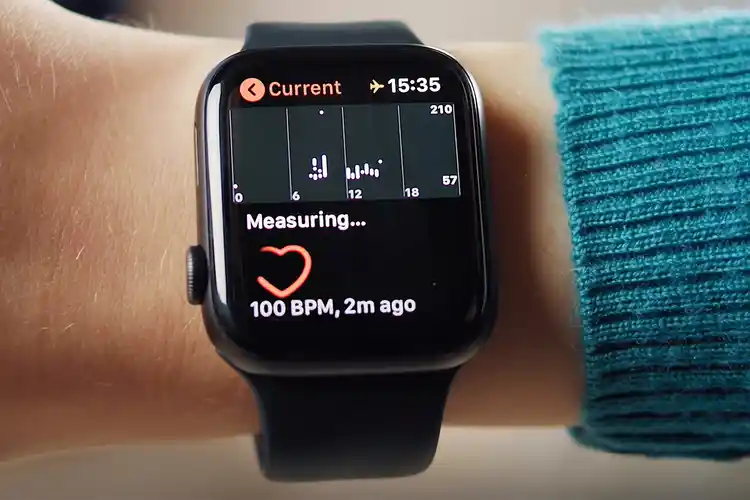June 13, 2023 – If you want to see the future of health care, just peek at your wrist.
As smartwatches and fitness trackers get more popular – some one in five Americans wear one – scientists are investigating how to use their data for a variety of health applications.
Studies suggest that smartwatches could detect infections like COVID-19, as well as heart problems like atrial fibrillation and even heart attacks – not to mention falls, seizures, and Parkinson’s symptoms. In a small 2022 study, heart rate measurements and step counts from fitness trackers were linked to key indicators of kidney and liver function, as well as overall health.

But according to Mount Sinai researchers, one potential clinical use deserves much more attention: Leveraging this technology to monitor people’s mental health.
“Only a few studies have tried to apply wearable devices to the study of psychological conditions,” said Robert Hirten, MD, clinical director of the Hasso Plattner Institute for Digital Health at Mount Sinai in New York City.
Hirten and colleagues hope to change that. In a recent study, they offer evidence that smartwatches can assess people’s psychological state while monitoring mental health traits like resilience.
“To our knowledge, there haven’t been other studies that have evaluated whether psychological resilience can be assessed using wearable devices,” Hirten said.
Why It Matters
An often touted benefit of wearables in health care is their potential to improve access to care. While traditional methods require a doctor visit or lab work, wearables gather data as the patient goes about their daily life, saving patients time and money and easing the workload of medical staff.
That’s “especially important” when it comes to mental health, said Hirten, “given limited mental health resources.” Data shows we’re facing an overwhelming shortage of mental health care workers, even as the rates of mental health conditions like depression are trending up. Many people who need help may struggle to afford it or live in remote areas, he said.
“The hope is that wearable devices can be used one day to complement and aid mental health professionals in their care of patients,” Hirten said.
Not only that, but wearables could empower people by providing them with valuable insights into their own mental health, says Zahi Fayad, PhD, another study author and director of the BioMedical Engineering and Imaging Institute at Icahn School of Medicine at Mount Sinai. “By measuring mental wellness,” he said, “the watch can inform the user to seek consultation with an expert, provide links to resources, and/or use online or watch-based mental health management tools.”
What the Study Showed
Researchers analyzed smartwatch data from 329 people over 14 days, and compared that data to standard measurements of resilience, optimism, and emotional support (the support one has from their social ties). These factors are linked to psychological well-being, improved mood, and reduced depression, the study notes.
Using a type of artificial intelligence called machine learning, the researchers were able to assess a person’s resilience and well-being based on their heart rate variability, the small time differences between each heartbeat.
Resilience helps you adjust and adapt to change, especially in stressful situations, Hirten said. It’s crucial for stress management, an important part of mental health.
“Our study shows wearables can be leveraged for stress detection and resilience assessment,” Fayad said. “Understanding our stress status could help us implement actionable tools to manage our psychological well-being and build resilience.”
Why Heart Rate Variability?
Our heart rate variability reflects activity in the autonomic nervous system, “the part of the nervous system that controls the body beyond our conscious control,” Hirten said. When you’re stressed – rushing to finish a big work project, fighting with your partner, or experiencing pain – your autonomic nervous system kicks into gear, triggering changes in heart rate and heart rate variability.
The variation tends to be lower when you’re stressed and higher when you’re relaxed, previous research shows, suggesting that people with high heart rate variability may be more resilient.
This study builds on that hypothesis – and provides evidence that wearable devices can be used to predict a person’s resilience, as well as an aggregate score of their resilience, optimism, and emotional support, the researchers said.
The Future of Smartwatches in Health Care
A big goal of this research is to help mental health providers monitor and care for their patients, Hirten said. But it could also be used “to monitor response to psychological interventions,” so providers can more quickly and accurately assess how well a treatment is working and adjust if needed.
It could also have implications for chronic disease management. “Resilience is an important psychological feature in the management of chronic diseases,” Hirten said. Ongoing research suggests resilience could help lessen the negative effects of chronic disease and enhance quality of life.
Still, more research is needed to validate these findings before they can be used for any clinical use, Hirten said. The researchers plan to conduct studies in other patient populations to further refine the algorithm.